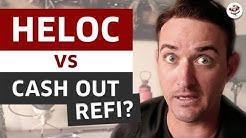Contents
VA Cash-Out Refinance. The VA Cash-Out refinance loan replaces your existing mortgage instead of complementing it. Qualified homeowners can refinance up to 100 percent of their home’s value for mortgage debt in some cases. In others, homeowners can refinance up to a lower percentage and use the cash to cover debt payments and other needs.
A cash-out refinance replaces your current mortgage for more than you currently owe, but you get the difference in cash to use as you need. This calculator may help you decide if it’s something worth considering, and give you a possible idea of a mortgage rate you might have after refinancing.
A cash-out refinancing takes place when a homeowner secures a new loan to replace the current mortgage, for more than the amount currently owed. The homeowner is then able to use the additional cash refinanced to pay off higher interest debt such as credit cards or to make home rennovations.
Cashed Out Meaning A cash-out refinance is a home loan where the borrower takes out additional cash beyond the amount of the existing loan balance. It can be used for things like home improvements, to pay for college tuition, or to pay off credit cards.
 What’s more, they may not disclose some of these costs up front, in the hope that you will feel too invested in the process to back out. A refinance commonly does not require any cash to close. One.
What’s more, they may not disclose some of these costs up front, in the hope that you will feel too invested in the process to back out. A refinance commonly does not require any cash to close. One.
A cash-out refinancing typically does carry a slightly higher interest rate than a straight refinancing. That’s because the lender takes on more risk with a cash-out refinancing, for no other.
Rebuilding cash position prior to refinancing the debt due in. business owner needs to know is what are the costs now and going forward. The company’s accounts are audited. We know how much money.
Lots of people are using their equity According to Black Knight Financial Services, cash out refinance mortgages. borrowing costs. On top of this, since home prices have risen by 30% over the past.
The cons. If you’re doing a cash-out refinance to pay off credit card debt, avoid running up your cards again. Closing costs: You’ll pay closing costs for a cash-out refinance, as you would with any refinance. closing costs are typically 3% to 6% of the mortgage – that’s $6,000 to $10,000 for a $200,000 loan.
Max Ltv Cash Out Refinance Refi Returns: Refinancing Under HUD’s FHA Section 223(f) Program Gains New Popularity – However, the more subdued capital markets may have drawn some Fannie Mae and Freddie Mac borrowers to the fha-insured refinancing program. These could be cash-rich borrowers. into effect last.
Cash-Out Refinance. The appraised value is reported at $150,000, allowing for a maximum cash-out loan of 90 percent of $150,000, or $135,000. The amount of cash available to the borrower is the difference between $135,000 and $100,000, less closing costs associated with the VA loan.
Mortgage Cash Out · How does a cash-out refinance differ from a rate-and-term refinance? A rate-and-term refi and cash-out refi both involve taking out a new loan to pay off your existing mortgage . With a rate-and-term, you borrow about the same amount as you currently owe and try to get a lower interest rate, different term or both.